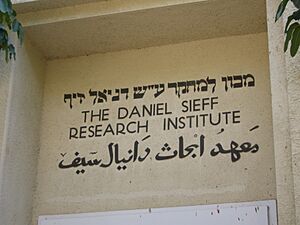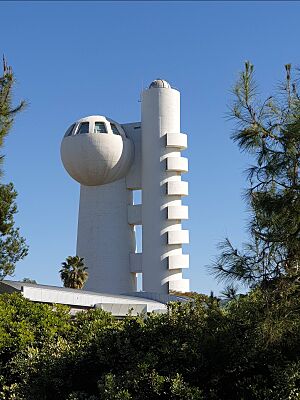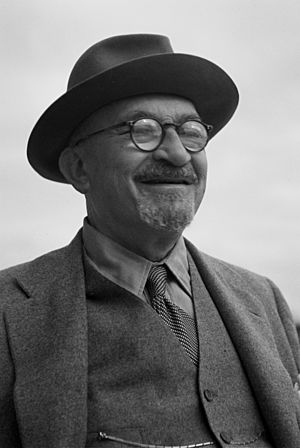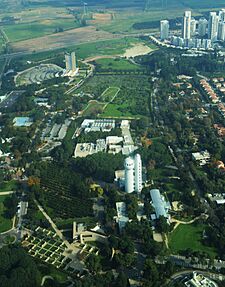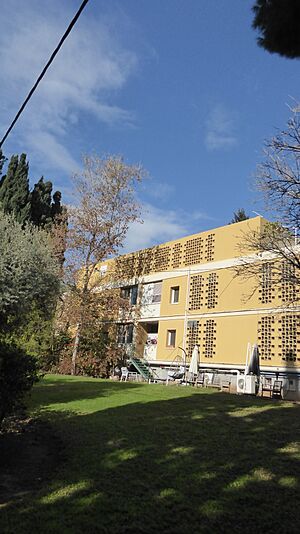Weizmann Institute of Science facts for kids
|
מכון ויצמן למדע (Hebrew)
|
|
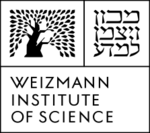 |
|
|
Former name
|
Daniel Sieff Research Institute (1934–1949) |
|---|---|
| Type | Public research |
| Established | 1934 |
| Founder | Chaim Weizmann |
| Endowment | $600.427 million (2019) |
| President | Alon Chen |
|
Academic staff
|
952 |
|
Administrative staff
|
400 |
| Students | 1,082 |
| Postgraduates | 356 |
| 700 | |
| Location |
Rehovot
,
|
| Campus | Urban |
| Postdoctoral fellows | 380 |
| Affiliations | Feinberg Graduate School |
The Weizmann Institute of Science (Hebrew: מכון ויצמן למדע Machon Weizmann LeMada) is a famous place for science research in Rehovot, Israel. It started in 1934, which was 14 years before Israel became a country.
Today, it's a big science center with about 3,800 scientists, students, and staff. They work on many different kinds of research. Unlike other universities in Israel, Weizmann only offers advanced degrees (like Master's and Ph.D.) in natural and exact sciences.
By 2019, six Nobel Prize winners and three Turing Award winners were connected to the Weizmann Institute.
Contents
History of the Institute
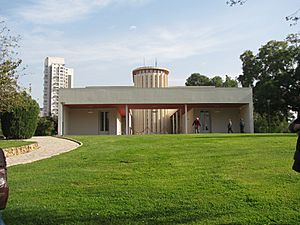
The institute was started in 1934 by Chaim Weizmann and his first team. It was first called the Daniel Sieff Research Institute. Weizmann wanted a Nobel Prize winner named Fritz Haber to lead it. But Haber passed away on his way to Palestine. So, Weizmann became the director himself.
Before he became the first President of Israel in 1949, Weizmann did his own research there. He studied organic chemistry. In November 1949, the institute was renamed the Weizmann Institute of Science to honor him.
In 1954–1955, the institute built WEIZAC, one of the world's first electronic computers. In 2006, it was recognized as a very important achievement in electronics.
In 1959, the institute created a company called Yeda Research and Development. This company helps turn new ideas from the institute into useful products. Yeda has many patents for discoveries, especially in marine genetics. By 2013, the institute was earning a lot of money from medicines like Copaxone and Rebif.
The Weizmann Institute also works with Elbit Systems on projects. These include a space telescope for the ULTRASAT program. They also research special materials for defense.
Damage to Buildings
On June 15, 2025, some buildings at the Institute were damaged. This happened during the night, so no one was hurt. Two buildings were directly hit: one for life sciences and one for chemistry that was still being built. Many other buildings were also damaged. This event affected important cancer research that had been going on for many years.
Graduate Studies
The Weizmann Institute is a place for advanced learning. In 2015, about 2,500 students, researchers, and staff were there. Students can earn Master's (M.Sc.) and Ph.D. degrees. They study subjects like math, computer science, physics, chemistry, and biology. There are also programs that combine different subjects.
The symbol of the Weizmann Institute is a Ficus tree with many branches. All students who are accepted get full financial support.
Fun Programs for Young People
The Weizmann Institute also has cool programs for young people. These include science clubs, summer camps, and competitions. The Bessie F. Lawrence International Summer Science Institute invites high school graduates from all over the world. They come for a four-week science camp.
The Clore Garden of Science opened in 1999. It's the world's first outdoor science museum where everything is hands-on. You can touch and interact with the exhibits!
Institute Achievements and Discoveries
Over the years, scientists at the Weizmann Institute have made amazing discoveries. These discoveries have led to many new technologies and products. The Yeda Research and Development Company helps manage these inventions.
In 2021, a new research unit called BINA was created. It helps connect basic science ideas with real-world uses. It helps scientists develop their early ideas and connect with experts in different industries.
By 2024, about 120 new companies had started based on research from the Weizmann Institute. In 2022, products based on the Institute's research made over $23 billion in sales worldwide.
Cool Inventions in Math and Computers
- WEIZAC: This was the first computer built in Israel. It was finished in 1955 at the Weizmann Institute. Later, three more computers called "Golem" were built.
- Biological Computer: In 2004, Professor Ehud Shapiro completed the world's first computer made from biological parts.
- Encryption Systems: Scientists here developed ways to scramble and unscramble information. These systems are used for things like decoding television shows.
Amazing Discoveries in Physics
- String Theory Beginnings: In 1967, Hector R. Rubinstein and his team did important research. This work helped start what is now known as string theory.
- Modified Newtonian Dynamics (MOND): In 1983, astrophysicist Mordehai Milgrom created MOND. This is a different idea to explain how galaxies move, instead of needing dark matter.
- Laser Systems: Advanced laser systems were developed for very precise cutting of diamonds.
- Quantum Computer: In 2022, Israel's first quantum computer was launched. It's called "WeizQC" and was developed by Professor Roee Ozeri.
Breakthroughs in Medicine
Many medical advances have come from research at the Weizmann Institute:
- Affinity Chromatography: This is a key method for separating biological substances. It's very important in the biotechnology industry.
- Living Polymers: A special technique that is fundamental to the polymer industry.
- Ribosome Structure: Professor Ada Yonath discovered the structure of the ribosome. This helped us understand how it works and earned her the Nobel Prize in Chemistry.
- Medicines: Several important medicines used worldwide were developed from Weizmann research. These include Copaxone, Rebif, Humira, and Erbitux.
- Bone Marrow Transplants: A new method for bone marrow transplantation was developed. It helps patients even if their donor is not a perfect match.
- Tumor Detection: A non-invasive procedure uses magnetic resonance imaging to tell the difference between harmful and harmless tumors.
Innovations in Agriculture
- Improved Crops: Scientists developed better types of farm crops. These include wheat with more protein and higher yields, early-ripening melons, and cucumbers that resist diseases.
- Hybrid Seeds: A method for growing hybrid seeds was created. These seeds do not pass diseases to the next generation of plants. This helps protect food crops from pests.
- Beta-Carotene Production: In the 1980s, Professor Mordechai Avron's lab found a way for a tiny alga called Dunaliella to produce a lot of beta-carotene. Beta-carotene is good for your eyes and skin. A nutritional supplement is now made from this alga.
Working with the Science Park
Weizmann scientists helped start "technology incubators." These places help scientists, especially new immigrants, develop their innovative ideas. One of the first incubators was in the nearby Kiryat Weizmann Science Park.
Sustainability Efforts
In 1989, the first solar tower in Israel was built on the campus. It's now called the "Migdal Shemesh."
In 2006, the Sustainability and Energy Research Initiative (SAERI) began. It supports discoveries in clean energy and other environmental research. This initiative has grown into the Institute for Environmental Sustainability. This new institute brings together all of Weizmann's research on sustainability. They work on topics like food security, climate research, renewable energy, and healthy environments.
Campus Buildings and Design
The Weizmann Institute campus is very large, covering about 1,250 acres. It has over 100 buildings and about 100 homes for scientists. Around 120 research students live in dorms on campus.
Historic Buildings on Campus
The Weizmann Institute has about 24 special heritage buildings. Some are carefully protected because they are very important architecturally. These include:
- Ziv Research Institute (1934): This was the very first building. It has writing in three languages and a special logo. Chaim Weizmann's original lab is still there.
- Weizmann Estate: This beautiful villa was built in 1936. It was the home of Chaim Weizmann and later served as the presidential residence. It also has his burial place and gardens.
- Yaakov Ziskind Building (1949): This was the first building after the institute got its new name. The first Israeli computer, WEIZAC, was installed here. It was also the first building in the Middle East with air conditioning!
- Koffler Accelerator Building (1975): This is a famous building for the nuclear physics department.
- Michael Sela Auditorium (1955): A cultural center named after Professor Michael Sela.
- David and Pella Schapell Holocaust Memorial Square (1954): A special memorial with a piece of a Torah scroll.
Campus Gates
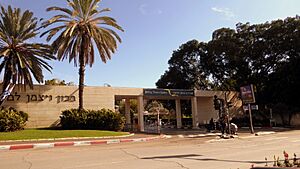
The Institute has six active gates:
- Main Gate
- Bloch Gate
- South Gate (for walking and biking)
- Pinsker Street Gate (for walking)
- Davidson Gate
- Train Gate (connects to the train station)
Visitor Centers
The campus has three places for visitors:
- Levinson Visitors Center (2011): Offers a free interactive tour and a short film. It also has a souvenir shop.
- Clore Garden of Science: Reopened in 2024 with nine themed areas. You need a ticket to enter.
- Weizmann House: The former home of Chaim Weizmann. It's now a place to learn about his life and legacy.
Beautiful Campus Gardens
The campus is like a big park with about 6,800 trees of over 100 different kinds.
- Acclimatization Garden: This garden from the early 1900s helped introduce new fruit trees like mango and avocado to Israel.
- Cactus Garden: A large garden with many different types of cactus plants.
- Japanese Garden: This garden has waterfalls, special stones, and aquatic plants.
- Bloch Avenue: A historic path lined with ficus trees, planted in the 1930s.
Images for kids
-
Faculty of Physics (Weissmann and Bonozio buildings)
Leaders of the Institute
- Chaim Weizmann (1934–1952)
- Meyer Weisgal (1952–1959 as acting director)
- Abba Eban (1959–1966)
- Meyer Weisgal (1966–1970)
- Albert Sabin (1970–1972)
- Israel Dostrovsky (1972–1975)
- Michael Sela (1975–1985)
- Aryeh Dvoretzky (1985–1988)
- Haim Harari (1988–2001)
- Ilan Chet (2001–2006)
- Daniel Zajfman (2006–2019)
- Alon Chen (2019–present)
Some leaders who were not scientists had scientific directors to help them. These directors included:
- Ernst David Bergmann (1949–1951)
- Amos de-Shalit (1960–1961 and 1966–1968)
- Shneior Lifson (1962–1966)
- Gerhard Schmidt (1969)
Notable Scientists
Many famous scientists have worked at the Weizmann Institute. Here are a few:
- Ruth Arnon, an expert in how the body fights disease.
- Shafrira Goldwasser, a computer scientist who won the Turing Award.
- Ephraim Katzir, a biophysicist who became the fourth President of the State of Israel.
- Michael Levitt, who won the Nobel Prize in Chemistry in 2013.
- Mordehai Milgrom, an astrophysicist who developed a new theory about galaxies.
- Amir Pnueli, a computer scientist who won the Turing Award.
- Adi Shamir, a cryptographer who won the Turing Award.
- Arieh Warshel, who won the Nobel Prize in Chemistry in 2013.
- Chaim Weizmann, a chemist and the first President of Israel.
- Ada Yonath, a crystallographer who won the Nobel Prize in Chemistry in 2009.
Former Students
Many students who studied at the Weizmann Institute have gone on to do great things. Here are some of them:
- Dorit Aharonov, a computer scientist.
- Alon Chen, a neuroscientist and the current president of the Institute.
- Jonathan Kipnis, a neuroscientist.
- Mario Livio, an astrophysicist.
- Raphael Mechoulam, an organic chemist.
- Nathan Seiberg, a physicist.
- Hermona Soreq, a molecular neuroscientist.
See also
 In Spanish: Instituto Weizmann de Ciencias para niños
In Spanish: Instituto Weizmann de Ciencias para niños
- List of universities in Israel
- Science and technology in Israel
 | Toni Morrison |
 | Barack Obama |
 | Martin Luther King Jr. |
 | Ralph Bunche |


